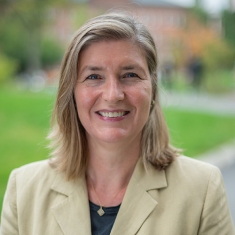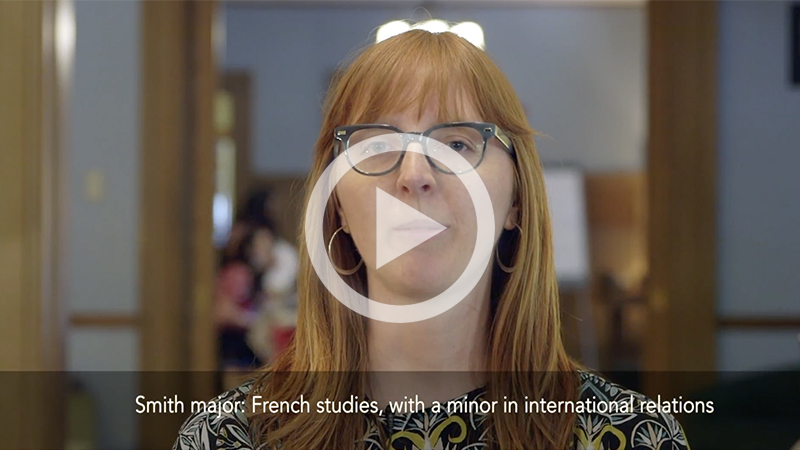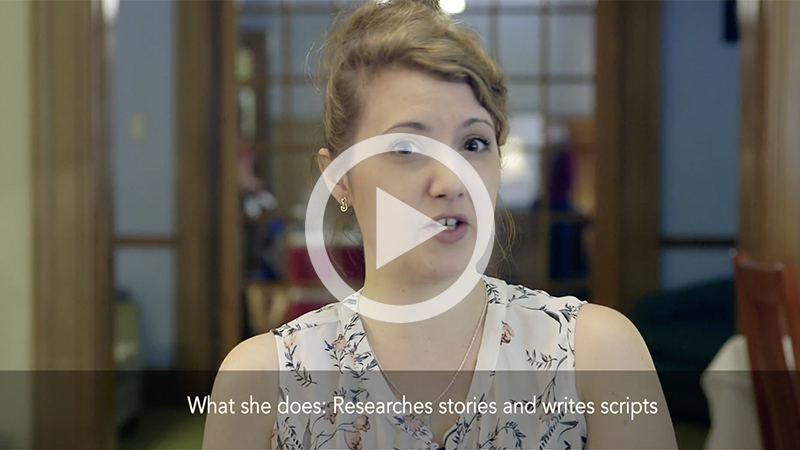French Studies

Explore the art of French, engage with its cultures and rediscover your own through others’ perspectives. The Department of French Studies offers about 30 courses in French language, literature and culture. Students build linguistic skills from beginning through advanced levels in grammar, phonetics and composition and use state-of-the-art technology to assist in their learning. French studies examines issues such as immigration, secularism, identity, gender and education across space (France and Francophone countries) and time, and at the crossroads of literary studies, art, history, linguistics and social sciences. Because the study of foreign languages and cultures lies at the heart of a liberal education, the department carries out its mission across disciplinary and institutional boundaries, and by directing and overseeing Smith’s Study Abroad programs in Paris and Geneva.
Above: Paris cityscape from the top of the Arc de Triomphe. Picture taken by Collin Benedict ’16 during junior year abroad.
Announcements
French Table
Duckett House Dining Rooms A & B, Tuesdays, 12:15 pm
Come join us - All levels of French welcome!
Association of American Publishers 2023 Prose Award Finalist
Hélène Visentin, associate dean of faculty and professor of French studies, recently co-edited La Princesse de Clèves by Lafayette: A New Translation and Bilingual Pedagogical Edition for the Digital Age, an EPUB published by Lever Press. This scholarly work is an AAP 2023 PROSE Award finalist in the category of Best eProducts. Read the AAP announcement.
-
As students learn and master the French language, they gain the ability to listen and speak articulately; read and analyze texts, cultural artifacts and digital media critically; and write clearly.
-
As they explore French and Francophone cultures, society, history, institutions and thought, they develop historical and comparative depth of perspective.
-
As they take courses in other departments and/or programs, they build an interdisciplinary framework to develop a comprehensive and nuanced understanding of the French and Francophone world.
-
As they engage with communities beyond Smith through study, internships, volunteer and other work opportunities abroad, they become global citizens who value tolerance, appreciate diversity and thereby become prepared to face the challenges of living in a rapidly changing world.
Advisers
Eglal Doss-Quinby, Dawn Fulton, Martine Gantrel, Jonathan Gosnell, Mehammed Mack, and Christiane Métral.
Requirements
Ten 4-credit courses or the equivalent at the 200 level or above, including the following:
- The basis for the French studies major: FRN 230;
- One language course at the advanced level (270, 385, or equivalent taken abroad);
- One course in French studies (FRN designation) on literature or culture before 1900;
- Three 4-credit courses in French studies (in addition to the advanced language course) at the 300 level or higher, of which two must be taken in the senior year.
In consultation with their major adviser, a student may count toward the major up to two 4-credit courses taught in English provided they are related to French studies, and up to two 4-credit courses in fields unrelated to French studies provided they are taught in French.
Normally, one course counting toward the major may be taken for an S/U grade. In consultation with their adviser, a student may take additional S/U credits toward the major. Students considering graduate school in the humanities are encouraged to take WLT 300 Literary Theory and Literary Practice: Conflicts and Consensus.
The Department of French Studies offers an online placement exam to test students' proficiency in reading, writing and understanding spoken French. The exam is accessible on Moodle and is open through the registration period. To access the test after registration, please email Jonathan Gosnell.
Students who have taken at least one year of French but have not taken the ETS French Achievement or Advanced Placement tests should take this exam. Even if you have taken those tests, we encourage all students to take the placement exam; it helps the department in advising students about course selection.
To evaluate how well students are achieving departmental learning goals, the Department of French Studies developed a series of assessment activities undertaken at different stages of a student’s career at Smith as follows:
- Under the guidance of their major adviser, students are asked to self-assess their proficiency in French, using tools created by the Common European Framework of Reference for Languages (CEFR), an internationally recognized set of guidelines used across Europe to describe foreign language proficiency in listening, reading, speaking and writing according to reference levels from A1 to C2.
- Students enrolled in the Smith Program Abroad in Paris are required to take the TCF (Test de Connaissance du Français, the equivalent of the TOEFL for English speakers) in the spring semester prior to their departure and at the end of their junior year abroad. The TCF is an official French language test administered by the French Ministry of Education, which evaluates student proficiency from A1 to C2 according to the CEFR standard. Students enrolled in the Smith Program Abroad in Geneva take a similar test upon their arrival in Geneva and before their departure.
Director
Dawn Fulton
430d Thesis (8 credits)
Full-year course offered each year
431 Thesis (8 credits)
Offered fall semester each year
The honors program is for French studies majors who desire to conduct independent research on a specific aspect of French or Francophone literature or culture during their senior year. Students are eligible to apply for the honors program either at the completion of the second semester of their junior year or before the end of the second week of classes in September of their senior year.
Eligibility
A student who applies to do honors work must have a 3.5 GPA in French studies. Honors students work closely with a faculty adviser to conceptualize and carry out study that culminates in a paper of about 50-80 pages in length or an equivalent project; this work is done either as FRN 430d (a full-year, 8 credit course, with thesis or project due by mid April of the senior year) or FRN 431 (a fall-semester, 8-credit course, with thesis or project due on the first day of the second semester of the senior year).
Presentation
The thesis or project may be presented in either English or French; the choice of language must be approved by the thesis adviser and the director of honors. FRN 430d or FRN 431 may substitute for one of the two 300-level French courses required in the senior year to complete the French studies major.
Evaluation
In the second semester of the senior year, the honors candidate will take an oral examination based on her thesis or project and the field in which it was written. Evaluation of honors work for the degree with "honors," "high honors," or "highest honors" is based on the following:
- 10 percent on the oral examination
- 60 percent on the evaluation of the final thesis project by the thesis adviser and a second reader
- 30 percent on the candidate's grades in the French studies major
Frequently Asked Questions
How should I prepare to do an honors thesis?
Students contemplating honors work should begin talking to professors in their area of interest during their junior year, at the latest. Many honors projects have developed from interests fostered by course work done at Smith or on a Junior Year Abroad.
How do I find an honors thesis adviser?
Most students use course experience or consult the department website to identify professors whose research interests coincide with theirs. The departmental director of honors can also be a resource for matching student interests to faculty expertise. The next step is to contact the relevant faculty member(s) to discuss the possibility of doing an honors project.
How do I apply for honors?
Interested students should consult the departmental honors section of the class deans website for complete information on applying for honors and for information on funding resources.
Can I do honors if I go abroad junior year?
Yes. In fact, many honors projects ideas begin on a Junior Year Abroad program. You should be prepared to approach your potential Smith adviser while you are still abroad.
What are the benefits of doing a thesis or honors project?
The honors project provides you the unique opportunity of immersing yourself in a research project to greater depth than anything else you will experience in your undergraduate studies. Your research and writing skills will develop immensely during the process. Many students derive great satisfaction from bringing an idea to full development and expression in an honors project.
What are the disadvantages to doing an honors thesis?
A thesis requires an enormous commitment of time and intellectual energy. The 8-credit thesis may mean that you take fewer courses during your senior year, which may limit your options for studying a wide variety of subjects. Some students report being intimidated by the writing commitment. However, if you think of the thesis as a related group of 3-4 papers, each 15-20 pages in length, accompanied by an introduction and conclusion, the task becomes feasible.
Please check the course catalog for up-to-date information. You can also see the Five College course schedule.
All classes and exams are conducted in French with the exception of cross-listed courses, unless otherwise indicated.
FRN 101 01 Accelerated Beginning French I
This elementary French course is designed to give students with no previous experience in French the opportunity to acquire the fundamentals of the French language and Francophone culture. It emphasizes communicative proficiency, the development of oral and listening skills, self-expression and cultural insights. Classroom activities incorporate authentic French material and are focused on acquiring competency in listening, speaking, reading and writing. Students must complete both 101 and 103 to fulfill the Latin honors distribution requirement for a foreign language. Enrollment limited to 25. {F} Credits: 5 Dawn Fulton
Spring 2023
FRN 103 01 Accelerated Beginning French II
This second-semester French course allows students to acquire the basic elements of spoken and written French. They learn how to express themselves on a variety of topics and in everyday life situations as they connect to the Francophone world through authentic cultural material and multimedia activities. Students completing the course normally enter FRN 220. Prerequisite: FRN 101 or equivalent. Enrollment limited to 18. {F} Credits: 5 Christiane Metral
Spring 2023
FRN 103 02 Accelerated Beginning French II
This second-semester French course allows students to acquire the basic elements of spoken and written French. They learn how to express themselves on a variety of topics and in everyday life situations as they connect to the Francophone world through authentic cultural material and multimedia activities. Students completing the course normally enter FRN 220. Prerequisite: FRN 101 or equivalent. Enrollment limited to 18. {F} Credits: 5 Maureen DeNino
Spring 2023
FRN 220 01 High Intermediate French
Review of communicative skills through writing and class discussion. Materials include two movies, a comic book and two novels. Prerequisite: three or four years of high school French; 103 or 120, or permission of the instructor. Students completing the course normally enter 230. Enrollment limited to 18 per section. {F} Credits: 4 Mehammed Mack
Spring2023
FRN 220 02 High Intermediate French
Review of communicative skills through writing and class discussion. Materials include two movies, a comic book and two novels. Prerequisite: three or four years of high school French; 103 or 120, or permission of the instructor. Students completing the course normally enter 230. Enrollment limited to 18 per section. {F} Credits: 4 Carl Cornell
Spring 2023
Please check the course catalog for up-to-date information. You can also see the Five College course schedule.
All classes and exams are conducted in French with the exception of cross-listed courses, unless otherwise indicated.
FRN 230 Colloquium in French Studies
Topics course.
A gateway to more advanced courses. These colloquia develop skills in expository writing and critical thinking in French. Materials include novels, films, essays and cultural documents. Students may receive credit for only one section of 230. Enrollment limited to 18. Basis for the major. Prerequisite: 220, or permission of the instructor.
FRN 230cc 01 Culture Clash
To what degree is being French synonymous with membership in a particular socio economic, cultural or ethnic category? Can marginalized populations (immigrants, peasants, workers, youth, etc.) acquire the necessary tools for social inclusion? What determines the meaning of French identity and who is excluded from the realm of Frenchness? By whom and for what reasons? The course will explore the tensions that arise in the development and transmission of French cultural attitudes, tastes and values. Class readings include children’s literature, fiction, and memoir. Students will complete six hours of guided weekly reading and twenty pages of formal writing during the semester. Enrollment limited to 18. {F} {L} WI Credits: 4 Jonathan Keith Gosnell
Spring 2023
FRN 230en 01 Encountering Nature in the Early Modern World: Flora, Fauna, Empire
"Encountering Nature” examines how writers from the 16th–18th centuries experienced their natural settings. These settings varied widely, encompassing both Europe and the Americas during early phases of colonization. The great variety of flora and fauna in these different locales prompted questions about what nature signified and for whom. How did such factors as gender, religion, ethnicity, and social class combine with political influences in each century to cause shifting understandings and representations of the natural world? To explore this question, we will analyze literary texts in multiple genres alongside illustrations, maps, paintings, historical documents, and audiovisual materials. {F} {L} WI Credits: 4 Theresa Brock
Spring 2023
FRN 230tl 01 Tahitian Letters: Island Paradise in the French Cultural Imagination
“I thought I had been transported to the garden of Eden”: the explorer Bougainville’s 1771 description of the abundance and beauty of “Taïti” set the tone for two centuries of exoticism in French literature and art. This course will explore legacies of Enlightenment, colonialism, feminism, and postcolonialism through the shifting representations of this so-called island paradise. Readings include travel narratives, philosophical texts, poetry, and novels by Rousseau, Diderot, Josephine de Montbart, Charles Baudelaire, Pierre Loti, and Chantal Spitz. Works will be approached in historical context, drawing connections with visual culture, global developments, and contemporary debates. Students may receive credit for only one section of FRN 230. Enrollment limited to 18. Basis for the major. Prerequisite: FRN 220 or equivalent. (E) {F} {L} WI Credits: 4 Maureen DeNino
Spriing 2023
FRN 250 01 Zooming with the French: Cross-Cultural Connections
Using webcam and video conferencing technology, students have conversations in real time with French students in Paris. We examine youth culture in France and explore fundamental cultural differences between Americans and the French. Topics include cultural attitudes and beliefs, social values and institutions as well as relevant socioeconomic issues. Materials: textbooks, cultural essays, surveys, articles, films and songs. Prerequisite: FRN 230 or equivalent. Enrollment limited to 15. {F} {S} Credits: 4 Christiane Metral
Spring 2023
FRN 251fi 01 Topics in French Media, Now and Then - French Islam and French Muslims
Through a survey of the contemporary flashpoints in the debate surrounding the place of Islam in French society, this course maps out the field of politicians, activists, youth movements, imams, artists, musicians, and other cultural actors that have defined the discourse on the issue. With an emphasis on new media, students analyze a wide variety of documents including internet resources, journalistic articles and blogs, music videos, films, legal texts, political pamphlets, slam poetry, rap songs, as well as photo and video art. {F} {H} Credits: 4 Mehammed Mack
Spring 2023
FRN 286 01 Invisible Minority: Chinese Culture in France
A reference to the French phrase 'minorité visible,' this course’s title highlights the recurrent critique from East Asians in France that theirs is a forgotten minority group. To understand this critique, we trace the history of exoticized representations of Chinese culture in France from the 17th century to the present. We then turn to recent literary works by Chinese diasporic writers to consider how they represent their native cultures for a French audience amidst China’s shift in status on the global stage. Finally, we examine images of Asian culture in contemporary French media and popular culture. {F} {L} WI Credits: 4 Dawn Fulton
Spring 2023
FRN 295 01 French Translation in Practice
Practicum in French; must be taken concurrently with WLT 150. Students read short texts in translation theory, study translation techniques and strategies, compare versions of translated texts and produce their own translations of French texts. Readings and discussions conducted in French. Prerequisite: two courses above FRN 230, or equivalent. This course does not count as preparation for the Smith Programs Abroad in Paris and Geneva. Corequisite: WLT 150. {F}{L} Credits: 2 Carolyn Shread
Spring 2023
Please check the course catalog for up-to-date information. You can also see the Five College course schedule.
All classes and exams are conducted in French with the exception of cross-listed courses, unless otherwise indicated.
Prerequisite: two courses in French studies above 230 or permission of the instructor. Course numbers reflect chronological periods and not the level of difficulty.
FRN 320 01 Women Defamed, Women Defended
What genres did women practice in the Middle Ages and in what way did they transform those genres for their own purposes? What access did women have to education and to the works of other writers, male and female? To what extent did women writers question the traditional gender roles of their society? How did they represent female characters in their works and what do their statements about authorship reveal about their understanding of themselves as writing women? What do we make of anonymous works written in the feminine voice? Readings include the love letters of Héloïse, the lais and fables of Marie de France, the songs of the trobairitz and women trouvères,and the writings of Christine de Pizan. {F}{L} Credits: 4 Eglal Doss-Quinby
Spring 2023
FRN 330 01 Scientific Selves: Medicine, Technology and Identity in Early Modern France
From the 16th-18th centuries, the Scientific Revolution led to breakthroughs in biology, medicine, and technology. This course examines how such breakthroughs informed attitudes toward various aspects of human identity in the French context. How did scientific discourse depict those who did not fit into paradigms of gender, sexuality, ability, ethnicity, belief, and culture? What parallels can we identify with modern-day activism? To explore these questions, we will analyze literary texts, visual representations, medical treatises, and scientific diagrams. We will also collaborate with the Botanic Garden to study medicinal plants, interrogate modern day health concerns, and create our own wellness tea blends. Prerequisites: 2 courses above FRN 230 or equivalent. {F}{L} Credits: 4 Theresa Brock
Spring 2023
Please check the course catalog for up-to-date information. You can also see the Five College course schedule.
TSX 330 01 Capstone Seminar in Translation Studies
Offered as WLT 330 and TSX 330. The capstone seminar brings together a cohort of concentrators to discuss a final translation project that each student undertakes with the guidance of their adviser in the concentration and to situate the project within the framework of larger questions that the work of translation elicits. The seminar readings focus on renowned practitioners’ reflections on the challenges, beauties and discoveries of translating, We compare how translations transform the original novel and question the concept of original text as it interacts with the culture and the language into which it is translated. Open to students in the Concentration in Translation Studies and students in World Literatures. Prerequisite: WLT 150. Enrollment limited to 12. Juniors and seniors only. Instructor permission required. {L} Credits: 4 Reyes Lázaro
Spring 2023
WLT 330 01 Capstone Seminar in Translation Studies
Offered as WLT 330 and TSX 330. The capstone seminar brings together a cohort of concentrators to discuss a final translation project that each student undertakes with the guidance of their adviser in the concentration and to situate the project within the framework of larger questions that the work of translation elicits. The seminar readings focus on renowned practitioners’ reflections on the challenges, beauties and discoveries of translating, We compare how translations transform the original novel and question the concept of original text as it interacts with the culture and the language into which it is translated. Open to students in the Concentration in Translation Studies and students in World Literatures. Prerequisite: WLT 150. Enrollment limited to 12. Juniors and seniors only. Instructor permission required. {L} Credits: 4 Reyes Lázaro
Spring 2023
Special studies provide a way for students to explore a particular topic or issue not taught in any course offered by the Department of French Studies and in the Five Colleges during the academic year of the proposed special studies.
Students work with a faculty adviser to create a syllabus comprising the description of the proposed special studies, a list of readings, work expectations, assignments and a timeline. The faculty adviser then brings the proposed course description and syllabus to the department for a formal vote.
The faculty adviser and the student normally meet weekly for an hour. Students are expected to write, at a minimum, a 20-page paper, or the equivalent. All work is conducted in French. Special studies carry 4 credits. The final grade is based on a separate grade to evaluate participation and preparation in addition to the grade given to the final paper.
Prerequisites: at least two 300-level courses in French studies; previous coursework on a relevant topic is strongly recommended.
In accordance with college policy, an exceptional special studies can be converted into an honors thesis. See the class deans website for information about departmental honors.
Normally, FRN 404 cannot be repeated for credit.
FRN 404 Special Studies
Admission by permission of the department; normally for junior and senior majors and for qualified juniors and seniors from other departments. Credits: 4
Members of the department
Normally offered each academic year
Emeriti
David Ball
Professor Emeritus of French Language & Literature and Comparative Literature
Mary Ellen Birkett
Professor Emerita of French Studies
Ann Leone
Professor Emerita of French Studies and of Landscape Studies
Denise Rochat
Professor Emerita of French Studies
James Sacré
Doris Silbert Professor Emeritus in the Humanities (French Language & Literature)
Janie Vanpée
Professor Emerita of French Studies and World Literatures
Lawrence Joseph
Professor Emeritus of French Language & Literature
Marie-José Delage
Professor Emerita of French Language & Literature
Resources
Each year the French department is fortunate to work with graduate students who come to Smith College for the Interdisciplinary Studies Diploma Program as part of our exchange with universities in Paris and Geneva. For the academic year 2022–23, we welcome three students from Paris and two from Geneva.
Paris
- Cécile Fonbonne (Université de Paris IV)
- Irina Jameron (Institut d’Etudes Politiques de Paris)
- Yaël Le Goff (Ecole Nationale Supérieure d’Architecture de Paris-Val de Seine)
Geneva
- Roxane Campiche (Université de Genève)
- Amandine Lacroix (Université de Genève)
Prizes & Fellowships
Coordinators of Prizes: Theresa Brock & Eglal Doss-Quinby
Prizes and fellowships are available to students studying French at Smith and on Junior Year Abroad (JYA) programs. Students interested in information about these prizes should consult the director of honors, or in the case of prizes and fellowships awarded to students on the JYA programs in Paris or Geneva, the current director of that program. Students interested in the Killam fellowship to Canadian universities should consult the director of graduate studies.
Recent French Studies Prize Winners (2021-22)
Césaire Prize: Gabrielle Bushala ’24, Nicole Papageorgiou ‘24
Voltaire Prize: Emily Pauwels ’25
Colette Prize: Xinran Chen ’25
Josephine Ott Prize (awarded in Geneva): Lily Boschin ’23, Lexie Casais ’23, Yulia Kuzniar ’23, Anna Maffa ’23, Grayson Matula ’23, Jennifer Wise ’23, Mika Yassur ’23, Sasha Yeutseyeva ’23, Kelly Zhang ’24J
Rousseau Prize (awarded in Geneva): Denielle Amparado ’23, Katie Raphaelson ’23
Ruth Alpern Leipziger Prize (awarded in Paris): Norma Jean Haynes ’23, Elizabeth MacNeil ’23
Submissions: Submissions for essay prizes are accepted each spring via this form.
If you need help converting photos into PDF documents, please consult these guidelines.
Please note: Submissions for the Colette, Césaire and Voltaire prizes must be received by 4:00 p.m. EDT one week before the last day of classes in the spring semester. For work completed in the academic year 2022-2023, the deadline is April 21, 2023.
Guidelines for Césaire, Colette, and Voltaire Prizes
- Only essays and projects completed for Smith College courses taken on campus in the last three semesters are eligible.
- Honors thesis and special studies projects are not eligible
- You may not submit more than one essay or project
What to submit: (in a single PDF)
- The final version of your essay or project, along with any and all professor comments, corrections and grades; if multiple drafts were evaluated by your professor, please include these in your submission file. As submissions will be judged anonymously, please remove your name if it appears on the title of your pdf submission file or if it appears on your essay or project (for instance, in a header or footer, or in the professor’s comments).
- A cover letter with the following information:
- your Smith ID number (99….)
- the title of the submitted work, the course, and semester in which you submitted it
- an explanation (maximum 150 words) of the reasons why you think this essay or project is your best work. For Colette submissions, the cover letter may be written in English. For all other submissions, the cover letter should be written in French
- If you received outside help on the essay or project, please acknowledge this by stating the name of the person who helped you and the kind of help received (content and/or grammar)
Voltaire Prize
Awarded to a student at Smith College for an essay or project completed in French for an intermediate literature or culture course that shows originality and engagement with their subject.
Note: FRN 220 essays or projects can only be submitted for the Colette Prize.
Césaire Prize
Awarded to a student at Smith College for excellence in an essay or project completed in French for an advanced literature or culture course on campus.
Colette Prize
Awarded to a student at Smith College for an essay or other project that shows originality and engagement in a French language course.
Josephine Ott Prize
Awarded to a Smith junior in Paris or Geneva for commitment to the French language and European civilization. (In one out of seven years the prize is given to a student studying on the Geneva program.)
Ruth Leipziger Prize
Awarded to one or more students studying on the JYA program in Paris.
Rousseau Prize
Awarded annually to a member of the junior or senior class studying with the Smith College program in Geneva.
Blumberg Fellowship
Funds up to five students on the Smith College JYA programs who design a project to be carried out during the summer after their academic year on the JYA program. The fellowship provides the opportunity for students to travel widely in the country of their program.
Baer Fund
Sponsors a student wishing to undertake a full-time internship during the summer after having studied at the JYA program in Geneva.
Julia Mayrant Rees Simonds ’95 France Internship Fund
Sponsors a student wishing to undertake an internship during the summer after having studied at the JYA program in Paris, or in Geneva, if there should be no candidates from the Paris program.
Killam Fellowship
Enables a Smith student to study in a Canadian university either for a year or for a semester. For more information, see the Fellowships website.
Smith’s long-established study abroad programs in Geneva and Paris attract about 30 students each year. Students live in university housing or with French-speaking families, attend classes with their French and European peers, and come back with near-native language skills and a real understanding of the culture. Majors find that this experience opens doors to careers in international relations, business, law, art and teaching. Majors in French studies who spend the year in Paris or Geneva will normally meet certain requirements for the major during that year.
Smith in Paris
Adviser: Mehammed Mack
Faculty Director:
2022-23: Howard Gold, Professor of Government
French-speaking students live abroad for a full year in a French home. Students study at the Paris universities with Smith program courses offered by French professors, volunteering, interning and enjoying excursions and cultural activities in a select group of 25 students. Students are advised by a Smith faculty director and a Parisian associate director at the beautiful Reid Hall Smith Center in Montparnasse. Learn more on the Study Abroad website.
Requirements
Students going on Smith programs abroad to Paris must meet the following requirements:
- GPA of 3.0
- Two years or the equivalent of college-level French, normally four four-credit courses, including one course at the 250 level or above in the spring semester of the year before study in Paris.
- Students who enter Smith at the 230 level or above are required to take at least three semesters of French prior to study in Paris, including one course at the 250 level or above in the spring semester of the year before study in Paris.
- Students beginning French with FRN 101 and 103 must take three four-credit French courses in their sophomore year, including one at the 250 level or higher in the semester prior to study in Paris.
Les Sciences à Paris
Les Sciences à Paris is a yearlong program designed explicitly to support students in the sciences, mathematics and engineering. Coursework, research opportunities and tutoring are combined into a customized curriculum enabling science students to experience the rich scientific traditions of France, acquire competence in French and experience the practice of science in an international context. Students with at least one year of college-level French or the equivalent are invited to apply.
Smith in Geneva
Adviser: Christiane Métral
Resident Director:
2014-present: Geneviève Piron
Track A. International Internship Program
Intern at an international organization at least three days per week; study French; take the core Humanitarianism and Practicum courses at the Smith Center; enroll in at least one Graduate Institute or University of Geneva course. Available fall or spring; can be combined with Track B or C for a year-long option. Applicants are expected to have at least one semester of college-level French or the equivalent.
Track B. University Studies Program
Enroll in four to five Smith Center and university courses each semester in either French or English, including a French language course. Available for the academic year for students with two years of college-level French or equivalent; and spring for students with at least one year of French or equivalent.
Track C. International Relations Program
Enroll in four Smith Center and Graduate Institute courses each semester, including French language. Take a core Humanitarianism course at the Smith Center along with other International Studies/Development courses at the Graduate Institute. Available fall or spring. Available for students with at least one semester of college-level French. Can be combined with Tracks A or B for a year-long option.
Frequently Asked Questions
Can I study in Paris or Geneva if I'm not a French major?
Yes, most definitely! Smith's JYA programs accomodate a wide range of majors.
Can I apply if I began French at Smith with FRN 101 and FRN 103?
Yes, but you will need to take three 4-credit French courses in your sophomore year.
How many French courses do I need if I studied French before I came to Smith?
Students going on the Smith College Study Abroad Program in Paris must have two years or the equivalent of college-level French, normally four four-credit courses, including one course at the 250 level or above in the spring semester of the year before study in Paris. Students who enter Smith at the FRN 230 level or above are required to take at least three semesters of French prior to study in Paris, including one course at the 250 level or above in the spring semester of the year before study in Paris.
Students interested in either of the academic options offered on the Smith College Junior Year Abroad in Geneva are encouraged to begin study of French and to pursue it prior to departure. Students on any track (A, B, and C) will study French language, or particular subjects of interest in French, while in Switzerland.
Are there courses recommended for preparation for study abroad on Smith's Paris or Geneva programs?
All courses at the 230 level and above will prepare you for study abroad in Paris and Geneva.
Where can I learn more about study abroad?
For more information, consult the French Studies study abroad advisers.
Cultural Resources
Le Louvre
France
Paris
Switzerland
Geneva
French Consulate in Boston
Dictionaries
Trésor de la Langue Française informatisé (TLFI)
French thesaurus
Gender and the French Language
Écriture inclusive
Le Conjugueur Blog
Literature & Language
L'Académie française
La Bibliothèque nationale de France
Gallica
Fabula
Amélioration du français CCDMDJ'aime la langue française
Facebook Page J'aime le français
Newspapers & Magazines
Le Monde
Le Monde Diplomatique
Libération
L'Humanité
Le Figaro
France Soir
Huffington Post
France Amérique
Le Nouvel observateur
L'Express
Marianne
Le Point
Courrier international
rue89
Causette
Radio & Television
France Inter
France Info
Europe 1
RTL
RMC
Beur FM
TF1
France 2
France 3
Radio Nova
France Culture
Canal +
Arte
M6
TV5
France 24
CFI
Beur TV
La Chaine parlementaire (LCP)
LCI
Fip Radio
RFI
Studying in the Humanities Today
MLA Action Network: "STEM or Humanities? Answer: Both," May 30, 2018
TEDTalk: Eric Berridge: Why tech needs the humanities
The ACTFL Call to Action
Infographic: Benefits of Language Learning
Smith Arts & Humanities
Alum Spotlight
Those majoring in and studying French can pursue many different careers. Graduates have gone on to teach at all levels; work in the foreign service, Peace Corps or in the arts; study law, business and medicine; and pursue advanced degrees in French literature, music, translation and theater.
Every year a number of French majors also successfully apply for one of the 1,500 openings for French teaching assistantships to teach English in a French lycée. Consult the Teaching Assistant Program in France site for the latest information on how to apply.
“After my JYA in Paris, I knew the city of lights was the place I wanted to live. I was hired at ESMOD, the oldest fashion school in the world. I translate marketing materials, prepare for open houses and field applications for courses. Thanks to my French major, I work in a beautiful building in the heart of Paris where I learn more about the French language and culture each day.”
Janan Fugel ’19, Chargée des Étudiants Étrangers, ESMOD France
“I couldn’t have been happier with my experience at Smith. Many of the language skills, literary references and cross-cultural understandings that I used while living abroad, post-graduation, and in my present career as a librarian in the Alliance Française network stem directly from my years as a French major.”
Christianne Beasley ’12, Head Librarian, French Cultural Center of Boston
“Studying French at Smith—especially on the JYA Paris program—ignited my passion for travel and set me on a path to completing a master’s in creative writing and translation. I now write for such magazines as Travel + Leisure, Architectural Digest, DuJour, the Wall Street Journal and many others.”
Laura Itzkowitz ’09, Freelance Travel Writer and Editor
Contact
Fax: 413-585-3339
Administrative Assistant:
Cora Lee Drew
Individual appointments may be arranged directly with the faculty.


















